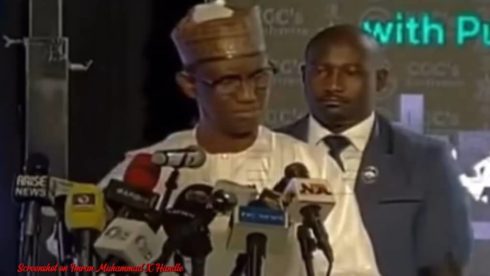National Security Adviser (NSA), Mallam Nuhu Ribadu, recently revealed critical insights into Nigeria’s petroleum subsidy policy, raising significant concerns over its unintended regional impacts. According to Mallam Nuhu Ribadu, a major portion of the fuel subsidized by the Nigerian government has been diverted to neighboring countries such as Niger, Chad, Burkina Faso, Cameroon, Benin Republic, and Ghana. This, he emphasized, suggests that Nigeria is inadvertently subsidizing fuel for other countries, rather than focusing on domestic needs.
The National Security Adviser, Mallam Nuhu Ribadu pointed out that the subsidy policy, designed to ease fuel prices for Nigerians, has led to rampant smuggling and distribution beyond Nigeria’s borders. This situation, Mallam Nuhu Ribadu Ribadu noted, benefits foreign citizens and unscrupulous local marketers more than it does the average Nigerian citizen. “Our own PMS [Premium Motor Spirit] was going all over,” he remarked, underlining the scale of the issue and the need for robust reform in the policy framework.
Foreign Investment Commitments: President Tinubu Secures Promising Economic Partnerships
President Bola Tinubu’s administration has announced over $30 billion in foreign direct investment commitments, less than two years into his tenure. This achievement, according to Mallam Nuhu Ribadu Ribadu, underscores the administration’s proactive approach to stimulating economic growth and development through strategic foreign partnerships. The statement was made during a press briefing held in Abuja, led by the Comptroller-General.
Mallam Nuhu Ribadu highlighted that these substantial commitments from foreign investors reflect growing confidence in Nigeria’s business environment under Tinubu’s leadership. This capital inflow is expected to bolster key sectors like energy, infrastructure, and technology, potentially creating thousands of jobs and reducing Nigeria’s dependency on oil revenue.
Concerns Over Subsidy Fraud: “Smart Nigerians” Exploiting Fuel Subsidies for Profit
Mallam Nuhu Ribadu expressed frustration over what he described as “smart Nigerians” who exploit the subsidy framework to their financial advantage. These individuals, masquerading as oil marketers, have allegedly been manipulating fuel distribution channels to facilitate cross-border smuggling. As a result, fuel meant to be sold at subsidized prices within Nigeria is being resold in neighboring countries at a premium.
This exploitation has resulted in significant losses for the Nigerian government, straining public funds and prompting questions about the integrity of the subsidy scheme. Mallam Nuhu Ribadu’s statement called for heightened regulatory measures and stricter enforcement against these fraudulent activities to prevent further economic drain and ensure subsidy benefits reach the intended population.
Economic Challenges Amid Rising Smuggling and Subsidy Misuse
As Nigeria grapples with subsidy challenges, the country faces increasing economic pressure due to ongoing smuggling and misuse of public funds. The government’s subsidy program, which aims to shield Nigerians from high fuel costs, has inadvertently spurred a black-market industry that is siphoning resources from an already strained economy. This raises concerns about long-term sustainability and fiscal responsibility.
These issues are exacerbated by currency depreciation and rising inflation, both of which impact Nigeria’s financial stability. The need for subsidy reform, Mallam Nuhu Ribadu suggested, is critical not only to mitigate smuggling but also to address broader economic challenges. A more targeted approach to subsidies could ensure that they directly benefit citizens, rather than being exploited across borders.
Policy Reforms on the Horizon: Addressing Nigeria’s Subsidy Challenges
In response to these challenges, the Nigerian government is reportedly considering a comprehensive subsidy reform policy. The policy aims to address issues like fuel smuggling, subsidy misuse, and the involvement of unauthorized marketers. Mallam Nuhu Ribadu emphasized the need for coordinated efforts across regulatory bodies to implement policies that will minimize cross-border fuel diversion.
These reforms are expected to involve increased surveillance, improved fuel distribution systems, and perhaps a gradual reduction in subsidies to discourage smuggling. The administration’s strategy reflects its commitment to protect Nigeria’s resources and promote economic stability by ensuring subsidies are used as intended, benefitting only Nigerian citizens.
The Future of Nigeria’s Economic and Energy Landscape
As Nigeria seeks foreign direct investment and faces internal subsidy challenges, the country’s future depends on effective policy adjustments and improved regulatory frameworks. With the government’s renewed focus on economic growth and public welfare, Tinubu’s administration is optimistic about Nigeria’s ability to attract global investors while preserving domestic resources.
President Tinubu’s economic vision, reinforced by the foreign investment commitments, suggests a promising future for Nigeria’s energy and infrastructure sectors. The nation’s path forward, however, will require vigilance, transparency, and cooperation between government entities to ensure that Nigeria’s wealth is harnessed for sustainable development and citizen well-being.
Table of Contents
Discover more from OGM News NG
Subscribe to get the latest posts sent to your email.














